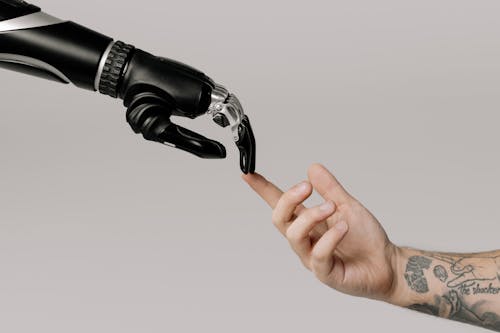Artificial Intelligence (AI) has rapidly emerged as one of the most transformative technologies of our time. Its integration into various aspects of our lives has become increasingly pervasive, from the smartphones we use to the recommendation algorithms shaping our online experiences. As AI technology continues to advance, its impact on society is becoming more profound, raising questions about how it will shape our future.

Unleashing Innovation:
One of the most notable aspects of AI technology is its ability to drive innovation across diverse sectors. In healthcare, AI-powered diagnostic tools can analyze medical images with unprecedented accuracy, aiding doctors in detecting diseases early and providing personalized treatment plans. Similarly, in finance, AI algorithms are revolutionizing risk assessment, fraud detection, and investment strategies, enabling institutions to make more informed decisions and mitigate risks.
Moreover, AI is playing a crucial role in scientific research and discovery. Machine learning algorithms are helping researchers sift through vast amounts of data to identify patterns and uncover insights that were previously inaccessible. From drug discovery to climate modeling, AI is accelerating the pace of scientific progress, offering solutions to some of the most pressing challenges facing humanity.
Furthermore, AI is transforming the way we interact with technology. Virtual assistants like Siri, Alexa, and Google Assistant have become integral parts of our daily lives, simplifying tasks and providing instant access to information. Natural Language Processing (NLP) models have advanced to the point where they can generate human-like text, powering applications ranging from chatbots to language translation services. As voice recognition technology improves, AI-driven interfaces are becoming more intuitive and user-friendly, enhancing the accessibility of digital services for people with disabilities.

Challenges and Concerns:
Despite its transformative potential, the rapid advancement of AI technology also raises significant challenges and concerns. One pressing issue is the ethical implications of AI-driven decision-making. As algorithms play an increasingly influential role in various domains, there are concerns about bias, accountability, and transparency. For example, biased training data can lead to algorithmic discrimination, perpetuating societal inequalities. Addressing these issues requires a concerted effort to develop ethical guidelines and regulatory frameworks that promote fairness, transparency, and accountability in AI systems.
Moreover, the widespread adoption of AI technology poses risks to employment patterns, as automation threatens to disrupt traditional job markets. While AI creates new opportunities for skilled workers, it also displaces workers in routine tasks, exacerbating income inequality and necessitating a reevaluation of education and workforce training programs. Addressing the societal impacts of automation requires proactive measures to reskill workers, promote lifelong learning, and ensure that the benefits of AI are shared equitably across society.
Privacy and security are additional concerns associated with AI technology. The vast amounts of data required to train AI models raise privacy concerns, as individuals’ personal information may be collected and analyzed without their consent. Moreover, the potential for AI-driven cyberattacks poses a significant threat to national security and individual privacy. To address these concerns, policymakers must enact regulations that protect consumers’ privacy rights and ensure robust cybersecurity measures are in place to safeguard against malicious actors.

The Impact on Everyday Life:
As AI technology becomes increasingly integrated into our daily lives, its impact on society becomes more pronounced. On one hand, AI has the potential to enhance efficiency, improve decision-making, and augment human capabilities. From autonomous vehicles to personalized recommendations, AI-driven innovations have the power to enrich our lives in numerous ways, making our cities smarter, our healthcare more personalized, and our digital experiences more seamless.
On the other hand, the widespread deployment of AI raises concerns about its societal implications. The erosion of privacy, job displacement, and the concentration of power in the hands of tech giants are among the challenges that must be addressed to ensure that AI benefits society as a whole. Moreover, there are concerns about the potential for AI to exacerbate existing inequalities, as marginalized communities may be disproportionately affected by biased algorithms and discriminatory practices.
The Role of Regulation and Ethical Frameworks:
To harness the potential of AI technology while mitigating its risks, policymakers and industry stakeholders must collaborate to establish robust regulatory frameworks and ethical guidelines. Regulations governing data privacy, algorithmic transparency, and accountability are essential to safeguarding individuals’ rights and promoting trust in AI systems. Moreover, fostering an ethical approach to AI development and deployment is crucial to ensuring that technology serves the common good. This includes promoting diversity and inclusivity in AI research and addressing biases in datasets and algorithms to prevent discriminatory outcomes.

Conclusion:
The rise of AI technology represents a paradigm shift with far-reaching implications for society. While it holds the promise of unprecedented innovation and progress, it also presents significant challenges that must be addressed to realize its full potential. By embracing responsible development practices, fostering collaboration between stakeholders, and prioritizing ethical considerations, we can harness the transformative power of AI to create a more inclusive, equitable, and sustainable future. As we navigate the complexities of the AI-driven world, it is essential to approach technological advancements with a mindset of ethical stewardship, ensuring that AI serves humanity’s best interests and contributes to the betterment of society as a whole.

Leave a Reply